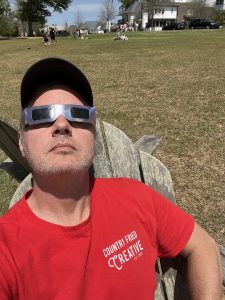Where were you during the great solar eclipse of April 8, 2024? I spent the afternoon in Fayetteville at our remote office located in the Town of Trilith. We were blessed with a nearly cloudless sky, creating the perfect conditions to see the solar eclipse in which the moon passes between the sun and Earth. Although not full totality from my location, we did have about 82% blockage of the sun.
Around 2:30pm, I stepped outside to view the eclipse. My immediate impression was that nothing was different other than noticing others looking up at the sun with special glasses, looking like moviegoers at a 3D movie. Moviegoers at Trilith? How befitting with the studio complex directly across the street. The irony is not lost on me, and I’m a movie fan myself.
I had enough common sense not to stare up at the sun without protection, so first I decided to try my polarized sunglasses (please do NOT do this, I later found out that even properly rated “regular” sunglasses don’t offer enough protection). It didn’t matter anyway because the sun was so bright I couldn’t look at it even with the sunglasses on – no eclipse.
Next, I took out my solar eclipse glasses. They looked like 3D glasses, as noted previously. The lenses were very darkly tinted, so much so that I couldn’t see anything with them. With my cardboard solar eclipse glasses on, I gazed up towards the sun. Wow! I could see the outline of the moon covering up about 1/3 of the sun. That’s all I could see with these filtered glasses. As soon as I looked away from the sun and took them off, it was a regular bright sunny spring afternoon. I shared my glasses with some other bystanders who were equally amazed.
After sharing my glasses, I put them back on and sat in one of the nearby Adirondack chairs and spent the next 30 minutes watching the moon slide across the sun. It was amazing. Around 3:05 pm, the peak totality of 82% for our area was achieved. Without the glasses, it was like an ordinary day except it seemed like the sun was filtered a little as if there were clouds, even though there weren’t any clouds. With the filtered glasses on, it was a totally different experience.
Filters are good and sometimes very necessary tools in life. We often talk about getting the unfiltered truth or data as if that’s always desired, but sometimes information can only be seen with a filter – much like the solar eclipse. Ask any photographer about the importance of filters. I spent the evening thinking about filters, which inspired this article. Just as my solar eclipse glasses were used to filter out harmful rays and allow the eclipse to be seen, businesses need filters to help discern and prioritize important information while minimizing distractions and even risks.
Here are some types of filters that I find useful in business:
- Information filtering – As a business leader, I’m simply drowning in information. Much has been written about information overload, and I know I’m not unique in this regard. One can simply spend all day trying to stay “in the loop” without actually doing anything. I often filter information by carefully using summaries. Every business presentation should have an Executive Summary. Do you use spreadsheets? Me too. The Filter function in Microsoft Excel is a lifesaver.
- Email / message filtering – Like you, I’m also overwhelmed with communications via emails, text messages, app alerts, phone calls, etc. I try to be very responsive, but I also have to be selective in processing communications. I filter my digital inbox using email and messaging rules so that the truly important stuff bubbles up to the top. Other stuff is still accessible when I have time to get to it. Family always gets top priority followed by my staff at work. I tell clients that they can always contact me directly via phone or text message to bypass the filter, but only if it’s an emergency. Most of my work filtering is done on purpose in order to ensure things are handled properly by the right people, which isn’t always me. If people go straight to me, I can become a bottleneck and I don’t want that.
- Opportunity filtering – One of my most important functions as a business leader is new business development. I’ve written previously about the importance of sales, but I also know that not every new opportunity is something to consider. On a daily basis various and sundry businesses are either trying to sell me things -or- buy my business. I have to filter those opportunities or else I’d be wasting my time and theirs.
- Decision filtering – Not every decision needs to be made by me, nor is every decision something that needs to be made immediately. Sometimes delaying a decision will cause the issue to resolve itself or by someone better equipped to handle it. In general, I believe decisions should be made at the lowest level in an organization where it makes sense. Doing so promotes empowerment and responsibility. If something makes it through the filters up to me, then my expectation is that it’s something that warrants my personal attention.
- News filtering – Recently I wrote a piece about where I get my news and the importance of getting it from a wide variety of sources. While it’s important to gain insights from a variety of perspectives, it’s also necessary to filter some of the news sources so that no one source or topic becomes dominant. I filter my news by source, topic, and format. I get headline news on my iPhone and Apple Watch, which keeps me dialed into breaking news. I read the news on my iPad and laptop for a deeper dive. Filtering allows me to focus on what’s important.
- Emotional filtering – Most of the filtering I’ve mentioned so far is fairly objective based on easy-to-define criteria. Emotional filtering is very subjective. As humans, we are emotional and moody creatures. Expressing emotions and allowing others to do the same is something uniquely human and not something that’ll be replaced by Artificial Intelligence (AI). Discretion is often needed to filter out unproductive emotions or ones that may be harmful to others. It’s also important when someone else is being emotional to react appropriately and apply a meaningful and compassionate filter in order to see things in a proper light.
- Time filtering – How I choose to spend my time is perhaps the most important decision I make as a leader. Time management is a personal decision informed by a number of factors. Being able to filter my time by priority, importance, and urgency allows me to be more effective overall so that the “squeaky wheel” isn’t the only thing getting attention. I personally use my Apple Calendar which syncs across all of my devices and has a handy filter option to help me manage my time. Filtering my time ensures I live a well balanced and productive life each day.
Solar eclipses are truly magical events, and the next one doesn’t happen for another 20 years here in North America. Assuming I’m still around, I can’t wait until it happens again. For a brief two-hour block of time, many people stopped what they were doing to view the eclipse. Many schools and local organizations had special viewing events. Sporting events stopped so that people could view it. I even encouraged my staff to go outside and safely view the eclipse. I read a statistic from Cloudflare that suggests that Internet traffic decreased by 50% in some locations during the eclipse event. Yet, the eclipse was only viewable with specially filtered glasses. To see the eclipse, a filter was necessary to not only protect my eyes but also to see the eclipse itself. When properly used, filters can promote efficiency, focus, empowerment, and risk mitigation. Whether you’re looking at a solar event like the eclipse or trying to focus in a busy world, filters can go a long way in ensuring clarity.
[Joe Domaleski, a Fayette County resident for 25 years, is the owner of Country Fried Creative – an award-winning digital marketing agency located in Peachtree City. His company was the Fayette Chamber’s 2021 Small Business of the Year. Joe is a husband, father of three grown children, and proud Army veteran. He has an MBA from Georgia State University and enjoys sharing his perspectives drawing from thirty years of business leadership experience. Sign up for the Country Fried Creative newsletter to get marketing and business articles directly in your inbox. ]

